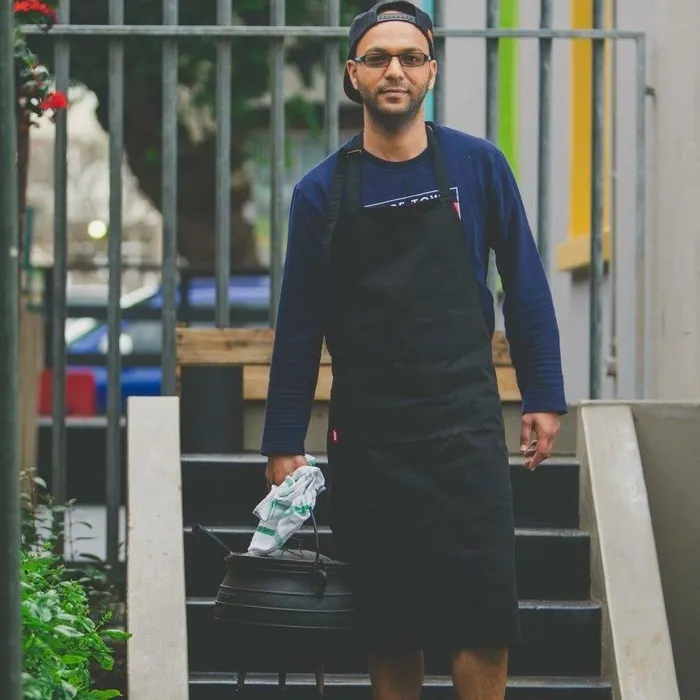The culinary journey of Chef Rev Batohi: where tradition meets modern cooking

Chef Rev Batohi is a classically trained, high-energy chef with extensive experience across the hospitality industry.
Image: Supplied
Chef Rev Batohi is a high-energy, classically trained chef with a multi-faceted background in the hospitality industry.
Batohi hails from Shallcross, a suburb in Durban with a strong Indian heritage, and has spent significant periods living and working in London and, more recently, along the North Coast of KwaZulu-Natal in Ballito and Umhlanga.
His culinary journey accelerated with the restaurant Pop-Up Society in Glenwood, and he has since owned and operated several other ventures. Today, his focus spans consulting, catering and hospitality projects that integrate local food production with culinary innovation.
"My love for food began in the home," Batohi said.
"I loved licking the spoon while my mother baked. During Diwali, I would sit on the counters, mixing batter and tasting whatever she made. Those moments set the stage for everything that came after."
For Batohi, inspiration comes from the ability to transform simple ingredients into meals that carry culture, memory and family tradition.
"The magic of taking something basic and turning it into something meaningful is at the heart of cooking for me," he explained.
"It becomes edible art tied to a place, a time, a community or a family. My mom and the South Indian cooks in my family have always been my greatest inspiration. They could make lemonade from lemons."
He is the creator of Chef Rev Hospitality and Marmalade Mist. His current work encompasses food-focused consulting, catering and a farmers' consortium that connects local and micro-farmers with retail markets, teaching recipes and cooking techniques along the way.
"As a chef, you have to maintain a unique identity in what you are doing. It is similar to being a musician within a genre. That is the space I try to occupy."
The rich culinary heritage of Durban’s Indian-origin community has deeply influenced his mission. "I realised that a large part of what the older generation holds in their minds and hands could be lost," he said.
"Even as a professionally trained chef, I found myself unable to recreate certain traditional dishes. That made me think about what would happen in ten years when these people are no longer able to cook these meals."
Batohi sees global trends and lifestyle pressures contributing to the decline of traditional cooking practices.
"People are expected to do so much within a 24-hour day. Convenience cooking has become the default. A frozen pizza or a ready-made meal becomes a home staple. Children and families get accustomed to these meals, instead of curries, stews or fresh salads that we grew up with."
He pointed to several dishes that he believes are at risk of disappearing.
"There is a forgotten recipe generation. Fish roe chutney, which was simple and nutritious, is almost extinct."
"Many traditional items like black tripe, chicken feet and other offal are no longer embraced by the younger generation, even though they are economical and high in nutrition. The westernisation of meals is changing the landscape of heritage food in KZN."
For Batohi, the kitchen is central to home life. "The focal point of a home should not be a phone. If you make the kitchen a primary space, the younger generation will experience more of what goes into cooking and what we eat. This is about preserving traditional values while integrating modern techniques."
He believes families can preserve their culinary heritage practically and accessibly.
"I am a huge advocate for the transcribe button on any smartphone. Speak the recipe into the phone. Grammar does not matter. Just capture it. Then, transfer it to a computer or email, creating a catalogue of your family’s recipes."
"I knew a family that collected seventy years of recipes from their grandmother into a book and distributed it to relatives. That is ideal, but even a simple catalogue is a fantastic start."
When it comes to balancing modern food trends with traditional cooking methods, Batohi sees it as a matter of context.
"At home, the focus is on economics, nutrition and time. In commercial spaces, it is about creating an experience that people do not get at home. Restaurant chefs have the responsibility to balance modern trends with traditional methods. It is not a fine line. It is about creating meals that feel familiar yet introduce innovation."
He is passionate about what he calls cooking with a purpose.
"Too many chefs chase celebrity status on television rather than focusing on purpose. For me, it is about engaging with local producers. Not every farmer produces ten tons for retail. Some have smaller gardens that need recognition.
"My purpose is rooted in local engagement and traditional practices, using heritage as a guide. Not every meal must be organic or locally sourced, but small changes at home matter. Look at produce and consider where it comes from."
Batohi emphasised the responsibility young chefs and caterers carry in shaping food culture.
"Invest in your craft. There is no substitute for hard work and mastering your skills. Being a chef is not glamorous. You wake up at two in the morning to chop carrots.
"Your work directly affects what goes into people’s bodies. If you view a chef as a pre-doctor, you understand the importance of ingredient integrity and community impact."
Looking ahead, Batohi has ambitious plans.
"In 2025, I will continue consulting in retail and hospitality to make an impact where I am involved. Food remains the focal point. Marmalade Mist will expand its seasonal micro-catering offerings, and the Marmalade Confetti Crate franchise will open its first store in November.
"There are several other initiatives in the works, and the journey continues."
Related Topics: